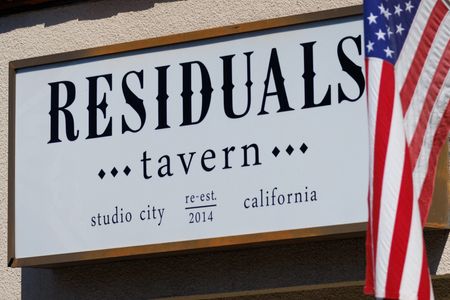By Lisa Richwine
STUDIO CITY, California (Reuters) – For actors trying to make it in Hollywood, a small residual check from one of their first jobs used to prompt laughter, and at one neighborhood watering hole, a drink on the house.
Residuals Tavern provided a free beer to any performer who brought in a check for less than $1 from reruns of TV shows or movies and posted the check on a wall.
But penny payouts have become far more common, actors say, and they are no laughing matter.
“Back in the late ’90s, it used to be kind of a rarity to get a tiny residual check,” actor John O’Brien said. “You could come in here, people would laugh and say ‘Hey I got one for 90 cents!’ and you’d get a free drink.”
In today’s streaming-TV era, small residual checks have become so customary that they helped push the SAG-AFTRA actors union to go on strike in mid-July, joining film and television writers, who walked off the job in May, in part over residual payments.
“It’s gotten to the point where I think a lot of people can’t believe it if they get a residual for $25,” O’Brien said. “They’re so used to opening those envelopes and it’s 30 cents.”
O’Brien, who has appeared on dozens of shows, from “Grey’s Anatomy” to “Pretty Little Liars,” shared images of residual checks from more than two decades ago worth $47.49, $87.77 and $216.25. Others, from the past few years, amounted to $1.63, 43 cents and 1 cent.
Residuals were created decades ago to supplement writers’ and actors’ base salary and help them survive between projects. The payments were doled out, for example, when a show was sold into syndication or a movie went to DVD. For working class actors who were not the famous, highly paid stars, the residual checks were vital to helping them pay their bills.
As much of Hollywood production shifted to streaming, the unions say residuals shrunk to the point where it became hard for many members to earn enough to live in Los Angeles.
Lower residual payments mean fewer actors earn the $26,470 per year needed to qualify for SAG-AFTRA’s health insurance coverage, said actor Michael Spellman. The union said about 14% of its 160,000 members currently meet that threshold.
The Alliance of Motion Picture and Television Producers (AMPTP), which represents Netflix, Walt Disney and other companies, said it has offered substantial increases in residuals.
“The largest streaming services would be paying 22% more in residuals, including 76% more in foreign residuals,” an AMPTP statement said.
The group has not released a detailed breakdown but said it has proposed more than $1 billion in higher pay, residuals and other benefits for SAG-AFTRA members.
‘EVERYBODY’S GETTING SQUEEZED’
At Residuals Tavern, founded in 1986, bartenders still serve free drinks for sums below $1, though they no longer post checks on the wall. Checks from the 1980s, in amounts as small as “zero dollars,” hang in two cases near the restrooms.
The bar sits in a strip mall about a mile from the Universal Pictures, Warner Bros. and Walt Disney studio lots. Sometimes a bona fide celebrity such as Justin Bieber drops in, but it is mostly a hangout for middle-class actors, crew members and people trying to break into show business. On a recent afternoon, one aspiring actor, who sometimes works the door, carried a guide to “Making It in Hollywood.”
Throwing darts nearby was Kirk Dinsmore, a laborer who helps with construction and other tasks on sets. He said he has not had a job since March when production slowed ahead of the Writers Guild of America (WGA) strike. Most filming of scripted TV shows and movies has stopped across Los Angeles.
In addition to laborers, “you’ve got prop makers, you’ve got electricians, you’ve got grips (lighting technicians), and every trade has been drastically affected,” Dinsmore said.
Actor Arabella Field, whose credits include “House” and “Seinfeld,” said SAG-AFTRA members did not expect to go on strike but felt they were put in a position where “we have no choice.”
“To be able to just make a living wage, that’s all we’re asking for,” she said at the tavern.
While payment formulas for actors may confuse people outside Hollywood, Field explained it this way: “We’re you. We’re the American worker. We’re the people working in the Amazon warehouse. It’s the same thing. Everybody’s getting squeezed.”
Spellman said he has been able to earn enough from TV roles and commercials for most of his two-decade career without taking side jobs.
As residuals declined, he added gigs such as leading tourist hikes to the Hollywood sign. This week, he is driving a dog across the country for a pet transportation company. Then it’s back to the picket lines.
“We’ve all been living check to check and we’re used to that,” Spellman said. “If anybody’s the survivor, it’s the actor. We’re out there as long as it takes.”
(Reporting by Lisa Richwine; Editing by Mary Milliken and Rosalba O’Brien)






